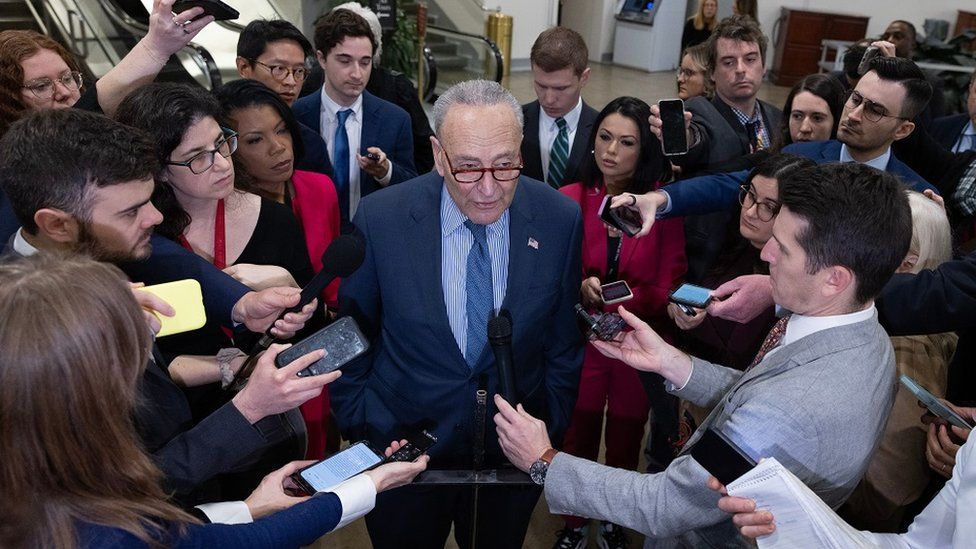ARTICLE AD BOX
 Image source, EPA
Image source, EPA
US Senate Majority Leader Chuck Schumer wants to get the new, revised foreign aid bill passed
By Francesca Gillett in Washington DC & Sam Cabral on Capitol Hill
BBC News
US lawmakers are hoping to salvage a military aid package for Ukraine and Israel, after the Senate voted down a major piece of legislation.
The failed bipartisan legislation tied tougher border restrictions with aid to Ukraine and Israel.
The bill, four months in the making, was doomed after Donald Trump urged Republicans to block it.
Republicans claim its immigration reforms do not go far enough, while some Democrats think they go too far.
Senators are now trying to fashion a new version of the legislation.
Democratic Senate Majority Leader Chuck Schumer has put forward a back-up bill, which strips out the immigration measures but leaves the foreign aid intact.
The $96bn (£76bn) package includes $60bn of support for Ukraine, $14.1bn in security assistance for Israel - as well as $9.15bn in humanitarian aid for the situations in Israeland Ukraine.
Another $2.44bn has been slated to support US operations in the Red Sea, and $4.83bn has been allocated to support US allies in the Pacific "and deter aggression by the Chinese government".
On Wednesday evening, senators were in negotiations on how to move forward with the revised bill - with no vote yet scheduled.
Republicans were reportedly holding discussions on adding border-related amendments to this version of the bill.
The original bipartisan border deal was voted down in the Senate on Wednesday afternoon, failing by 50 votes to 49.
The $118bn package included about $20bn of funding for the US-Mexico border.
Among the most significant elements related to immigration in the 370-page deal was a new federal authority that would have mandated a complete shutdown of the border when migrant numbers reached a certain threshold.
In practice, this would have meant that migrants who arrive in the US illegally after that threshold is reached would no longer be allowed to request asylum and would be deported shortly thereafter.
But Republicans rejected the measure before any legislative text had been unveiled, alleging its border reforms did not go far enough.
Immigration has emerged as the top issue driving Republicans to the polls in support of Mr Trump, who is the front-runner to face President Joe Biden in the November general election.
Mr Trump urged his party to reject the deal, and almost all Republican Senators voted against it.
Republican Senate minority leader Mitch McConnell had previously backed and actively participated in negotiations over the bill - but reversed course earlier this week and voted 'no', saying the bill "has no real chance of becoming law".
The next three most senior Republicans in this chamber - John Cornyn, John Thune and John Barrasso - also voted against the bill. Only four Republicans backed the measure.
That included lead negotiator James Lankford, who reminded colleagues in a futile final pitch that Americans sent them to Washington to "get stuff done and solve problems".
Several Democrats, including Elizabeth Warren, Alex Padilla and Bob Menendez also voted against the bill because they did not agree with its border reforms.
Speaking at a private fundraiser in New York on Wednesday evening, Mr Biden expressed his disbelief at the result, saying it came after Democrats agreed to most Republicans demands on the border.
He said Republicans were "walking away because they've got Donald Trump calling and threatening them".
US military aid to Ukraine has been on hold since December because Congress has not been able to agree to send more. Republicans had said they would only support more aid for Ukraine if they got extra measures to tackle the border crisis - hence why the bipartisan bill, which has now been rejected, was drawn up.
The US is, by some stretch, the biggest provider of aid to Ukraine, and Ukraine has warned that the war effort and its public finances are at risk if further Western aid is not forthcoming.
Earlier, the White House national security adviser Jake Sullivan - who was in Brussels for talks with the head of Nato - said the US "can and will" deliver the needed aid.
He admitted there had been a "lot of toing and froing" in Congress - but added "in the last 24 hours you've seen a significant number of Republicans come out and say that no matter what else happens, we need to move forward a package of support for Ukraine".

 11 months ago
98
11 months ago
98








 English (US) ·
English (US) ·